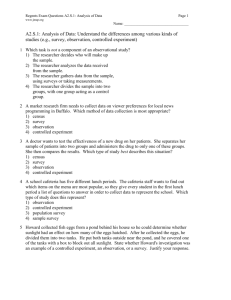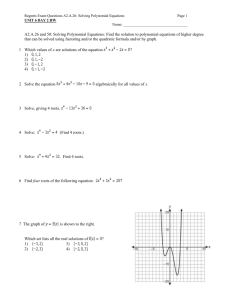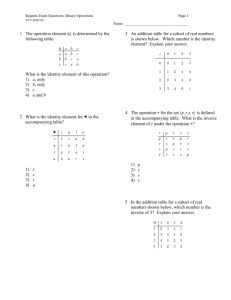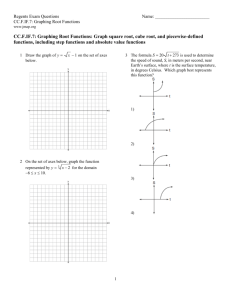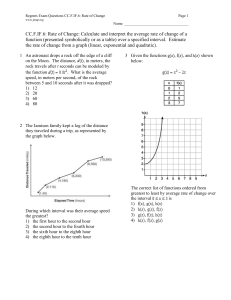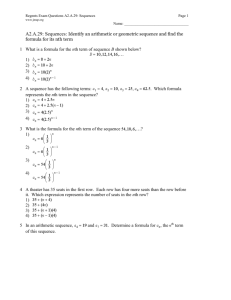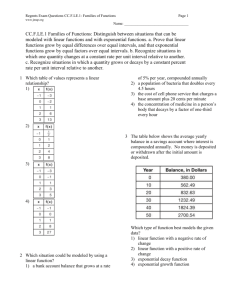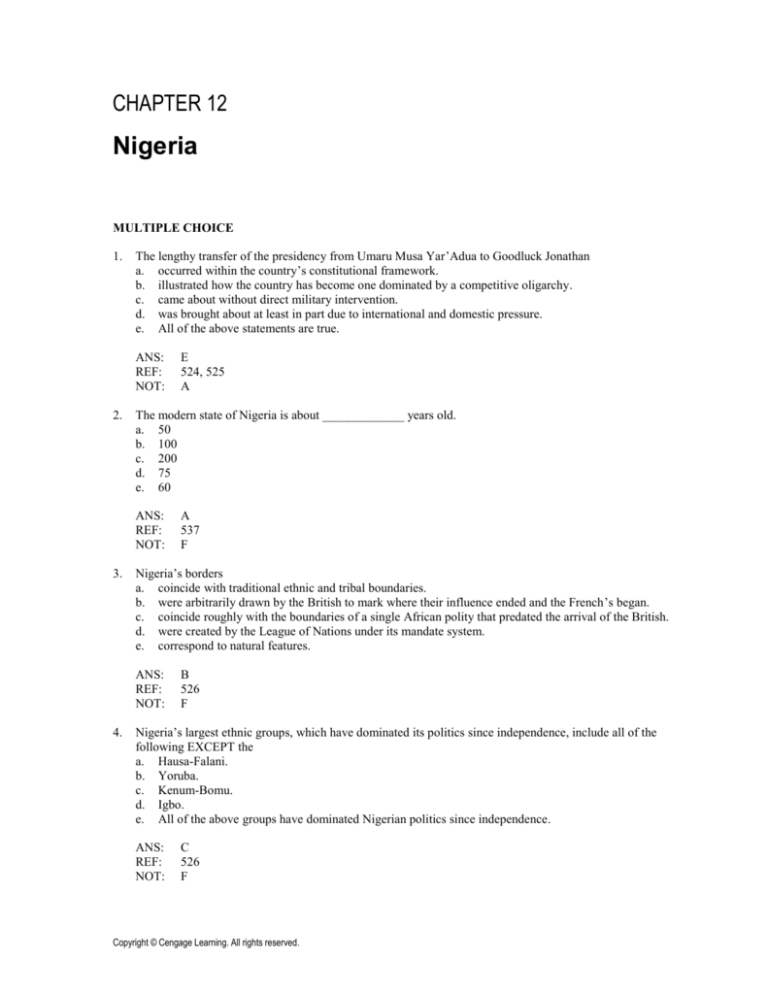
CHAPTER 12
Nigeria
MULTIPLE CHOICE
1.
The lengthy transfer of the presidency from Umaru Musa Yar’Adua to Goodluck Jonathan
a. occurred within the country’s constitutional framework.
b. illustrated how the country has become one dominated by a competitive oligarchy.
c. came about without direct military intervention.
d. was brought about at least in part due to international and domestic pressure.
e. All of the above statements are true.
ANS:
REF:
NOT:
2.
The modern state of Nigeria is about _____________ years old.
a. 50
b. 100
c. 200
d. 75
e. 60
ANS:
REF:
NOT:
3.
A
537
F
Nigeria’s borders
a. coincide with traditional ethnic and tribal boundaries.
b. were arbitrarily drawn by the British to mark where their influence ended and the French’s began.
c. coincide roughly with the boundaries of a single African polity that predated the arrival of the British.
d. were created by the League of Nations under its mandate system.
e. correspond to natural features.
ANS:
REF:
NOT:
4.
E
524, 525
A
B
526
F
Nigeria’s largest ethnic groups, which have dominated its politics since independence, include all of the
following EXCEPT the
a. Hausa-Falani.
b. Yoruba.
c. Kenum-Bomu.
d. Igbo.
e. All of the above groups have dominated Nigerian politics since independence.
ANS:
REF:
NOT:
C
526
F
Copyright © Cengage Learning. All rights reserved.
162
5.
Chapter 12: Nigeria
Which of the following statements about the country’s precolonial era is NOT true?
a. Several precolonial societies had democratic elements.
b. Centralized states developed in both the north and the south.
c. Parts of the area were occupied by stateless societies without diffuse political authority.
d. Islam was introduced through a series of jihads.
e. The Fulani Empire held sway until British colonial authority was imposed on Northern Nigeria in 1900.
ANS:
REF:
NOT:
6.
Britain ruled Nigeria through local rulers and tribal chiefs in a system known as
a. divide and conquer.
b. indirect rule.
c. a patron-client relationship.
d. a fiefdom system.
e. neocolonialism.
ANS:
REF:
NOT:
7.
E
529, 530
A
Nigeria’s First Republic
a. lasted less than one year.
b. was a parliamentary system generally dominated by southern ethnic groups.
c. was a parliamentary system generally dominated by northern ethnic groups.
d. was a mixed system in which the three major ethnic groups were each ensured a leadership position.
e. was a constitutional monarchy.
ANS:
REF:
NOT:
9.
B
529
C
British colonialism helped to ensure that ethnicity would be the primary element in political identification and
mobilization by
a. establishing administrative regions on the basis of ethnicity.
b. permitting the development of ethnically-based associations.
c. fostering competition among ethnic groups.
d. utilizing local leaders to help support their colonial rule.
e. All of the above were implemented by British colonialism to help ensure that ethnicity would be the
primary element in political identification and mobilization.
ANS:
REF:
NOT:
8.
D
527, 528
A
C
531
A
The military first intervened in Nigerian politics in
a. 1961.
b. 1962.
c. 1964.
d. 1966.
e. 1972.
ANS:
REF:
NOT:
D
531
F
Copyright © Cengage Learning. All rights reserved.
Chapter 12: Nigeria
163
10. In 1967, the Igbo attempted to secede and form their own country called
a. Biafra.
b. Eastern Nigeria.
c. Southern Nigeria.
d. The Republic of Nigeria.
e. Darfur.
ANS:
REF:
NOT:
A
531
F
11. All of the following contributed to the collapse of Nigeria into civil war in 1967 EXCEPT
a. the “northernization” policies of the First Republic.
b. the deaths of many northern officials in a coup.
c. ethnic violence directed against Igbos in northern Nigeria.
d. massive protests by Nigerian civil society groups, organized along ethnic lines, against the government.
e. All of the above contributed to the civil war.
ANS:
REF:
NOT:
D
531
A
12. Nigeria’s Second Republic
a. was a parliamentary system.
b. was dominated by southern ethnic groups.
c. came about after the military ceded power to a hand-picked civilian government.
d. came to an end when the military staged a coup following elections marked by widespread fraud and
violence.
e. lasted for over ten years.
ANS:
REF:
NOT:
D
532
A
13. What strategy was pursued by both General Ibrahim Babangida and General Sani Abacha to prolong their
rule?
a. Both promised plans to return the country to civilian rule then regularly delayed the implementation of
these plans.
b. Both converted themselves into civilian presidents by officially retiring from their military positions.
c. Both manipulated ethnic groups in order to maintain their rule.
d. Both set up “transitionary governments” that were meant to fail and thus allow the military to again
intervene.
e. Both established single-party regimes under their leadership.
ANS:
REF:
NOT:
A
533
F
14. Which of the following statements about events during the Fourth Republic is TRUE?
a. Its first president, Olusegun Obasjano, undertook a number of steps towards democratization, such as
retiring military officers who held power under military governments, while he simultaneously sought to
use nondemocratic means to sustain his stay in power.
b. Its first president, Olusegun Obasjano, promised an anticorruption campaign but failed to deliver on this.
c. Its second president, Umaru Musa Yar’Adua, was largely ineffective due to failing health and political
challenges.
Copyright © Cengage Learning. All rights reserved.
164
Chapter 12: Nigeria
d.
e.
The military has not intervened in politics but has threatened to do so.
All of the above statements are true.
ANS:
REF:
NOT:
E
533, 534
A
15. Clientelism is the practice by which a particular group receives disproportionate policy benefits or political
favors from a political patron, usually at the expense of the larger society. In Nigeria, patrons are typically
linked to clients by any of the following ties EXCEPT
a. ethnicity.
b. culture.
c. religion.
d. ideology.
e. All of the above represent ties through which patrons and clients are tied together in Nigeria.
ANS:
REF:
NOT:
D
537
A
16. Since its independence, Nigeria has had all of the following types of government EXCEPT
a. single party rule.
b. presidential rule.
c. parliamentary rule.
d. military rule.
e. Nigeria has had all of these forms of government since independence.
ANS:
REF:
NOT:
A
548,549
A
17. Both military and civilian governments of Nigeria have tended to adopt what kind of economic posture?
a. One characterized by laissez-faire, with the state playing a minimal role in the economy
b. An interventionist one with the state intruding unhindered into the major sectors of the economy
c. A mixed one involving some government planning and intervention but with a strong market-based
economy as well
d. A command economy involving the government setting five-year economic plans for the entire economy
e. A predatory one in which political leaders regularly use their positions for economic benefit
ANS:
REF:
NOT:
B
536
A
18. The informal sector accounts for about _____________ of Nigeria’s GDP.
a. one-third
b. one-quarter
c. one-fifth
d. one-half
e. one-tenth
ANS:
REF:
NOT:
C
538
F
19. Nigeria moved from self-sufficiency in food production to heavy dependence on imports due to all of the
following EXCEPT
Copyright © Cengage Learning. All rights reserved.
Chapter 12: Nigeria
a.
b.
c.
d.
e.
165
drought.
the Biafran War.
the emphasis on oil at the expense of agriculture.
the insistence of international organizations on use of genetically modified crops.
little government support for small farmers.
ANS:
REF:
NOT:
C
535
A
20. Since the early 1970s, Nigeria has relied upon oil for about _____________ percent of its exports and about
_____________ percent of its government revenues.
a. 60; 75
b. 80; 50
c. 90; 50
d. 75; 75
e. 90; 75
ANS:
REF:
NOT:
E
539
F
21. Oil has had what kind of economic impact on Nigeria’s economy?
a. It has provided enormous revenues that have been channeled by the state to benefit wide sectors of
society.
b. It has provided enormous revenues but has also fostered a neglect of other economic sectors.
c. It has provided enormous revenues that have been used to invest in the country’s infrastructure so as to
increase manufacturing.
d. It has provided enormous revenues that have been used to finance the domestic production of technology
for additional extraction.
e. It has had all of the above effects.
ANS:
REF:
REF:
B
538
A
22. The Nigerian Economic Summit Group (NESG) refers to
a. an economic interest group in Nigeria.
b. an attempt at economic planning that involves the coequal participation of both representatives from
government and the private sector.
c. the Nigerian bureaucracy responsible for establishing national economic plans.
d. the body of economic advisors to the president.
e. an effort between Nigerian domestic firms and multinational corporations to coordinate their activities.
ANS:
REF:
NOT:
B
541
F
23. Both Vision 2010 and the National Economic Empowerment and Development Strategy (NEEDS) call for all
of the following EXCEPT
a. diversifying the export base beyond oil.
b. central bank autonomy.
c. rebuilding the country’s education system.
d. encouraging population growth both to support the labor market and to build a domestic market.
e. meaningful privatization.
Copyright © Cengage Learning. All rights reserved.
166
Chapter 12: Nigeria
ANS:
REF:
NOT:
D
541
F
24. Nigeria’s structural adjustment program
a. privatized some publicly-owned firms, although not as quickly or extensively as had been expected.
b. was enacted as part of a deal to receive aid from the World Bank and the IMF.
c. was necessary due to a number of economic problems including waning oil revenue, a growing debt
burden, and balance of payments difficulties.
d. led to cutbacks in social welfare spending.
e. All of the above statements are true.
ANS:
REF:
NOT:
E
539, 543
A
25. Arguably, President Obasanjo’s greatest economic achievement was
a. improving the average GDP of Nigeria.
b. paying off much of the country’s massive foreign debt.
c. implementing a government-funded universal primary education system.
d. privatizing the oil industry.
e. curbing the country’s rampant corruption.
ANS:
REF:
NOT:
B
542
F
26. About _____________ percent of Nigerians live on less than a dollar a day.
a. 90
b. 50
c. 70
d. 30
e. 25
ANS:
REF:
NOT:
C
543
F
27. Which of the following is NOT an illustration of the regional, religious, and ethnic dimensions of the
Nigerian economy?
a. Christians argue that past governments have been tilted towards Muslims located in the north in terms of
the distribution of economic resources while Muslims fear that more current governments have tilted the
balance towards the more Christian south.
b. Ethnic and religious-based associations have served as vehicles for mobilizing economic activity.
c. Under British colonialism, investments were made in the infrastructure in the south thus resulting in a
situation that resulted in better economic advancement in that area after independence.
d. The majority of the country’s poor are located in the Middle Belt, occupied by minority ethnic groups.
e. Minority groups living in the oil-producing regions have undertaken actions, both peaceful and violent,
in an effort to gain a greater share of oil revenues.
ANS:
REF:
NOT:
D
536, 544, 545
A
28. Which of the following BEST illustrates the political and economic standing of women in Nigeria?
Copyright © Cengage Learning. All rights reserved.
Chapter 12: Nigeria
a.
b.
c.
d.
e.
167
Even though they form the bulk of agricultural producers, they are prohibited from owning land.
They are grossly underrepresented in the government.
Historically, women’s groups have tended to be token appendages of male-dominated organizations.
Increasingly, women’s groups have begun to focus on explicitly political goals.
All of the above illustrate the political and economic standing of women in Nigeria.
ANS:
REF:
NOT:
E
545
A
29. Which of the following does NOT illustrate Nigeria’s standing in the global economy?
a. Nigeria is the largest economy in the West African subregion.
b. Nigeria is the only African member of the G20 grouping, an annual convention of the world’s largest
economies.
c. Despite its oil revenues, Nigeria remains dependent on Western countries, as well as China, for finance
capital and production technologies.
d. Nigeria’s dependence on oil revenues makes its economic development susceptible to boom and bust
cycles.
e. Nigeria is a major player in the global energy market, producing some 2 million barrels of oil daily, most
of it for export.
ANS:
REF:
NOT:
B
546, 547
A
30. Which of the following statements about U.S.-Nigerian relations is NOT true?
a. A close relationship between the United States and Nigeria began during the Cold War when Nigerian
governments generally aligned their foreign policies with that of the United States.
b. The United States buys about 8 percent of its oil exports from Nigeria and this has generally muted its
criticism of Nigerian domestic politics.
c. Since 9/11, Nigerian and American military forces have cooperated in joint anti-terror exercises on the
African continent.
d. A sizeable Nigerian diaspora exists in the United States and has recently begun to exercise some
influence over American foreign affairs.
e. Nigeria modeled its presidential and federal systems on those of the United States.
ANS:
REF:
NOT:
C
547
A
31. The Nigerian national question could best be stated as
a. should Nigeria have a presidential or parliamentary system?
b. how is the country to be governed given its great diversity?
c. how should Nigeria privatize its state-owned industries?
d. which religion should be adopted as the national religion?
e. should Nigeria remain a single country?
ANS:
REF:
NOT:
B
548
C
32. Nigeria’s prolonged experience with military rule has resulted in a political culture that is primarily
a. democratic with widespread civic participation.
b. dictatorial.
c. dependent upon the military for support.
d. authoritarian despite the formal democratization of state institutions.
Copyright © Cengage Learning. All rights reserved.
168
Chapter 12: Nigeria
e.
apathetic.
ANS:
REF:
NOT:
D
549
A
33. Nigerian politics has generally followed a policy of rotation of political offices based upon
a. gender.
b. religion.
c. ethnicity.
d. military branch.
e. both religion and ethnicity.
ANS:
REF:
NOT:
C
549
A
34. Which principle is NOT part of the current Nigerian constitution?
a. Ethnic rotation of political office
b. ”Federal character”
c. Federalism
d. Checks and balances
e. Independent judicial branch.
ANS:
REF:
NOT:
A
549
A
35. Which statement describes the difference between ethnic rotation and federal character?
a. The former refers to a practice of rotating political offices among the different ethnic groups whereas the
latter refers to the federal structures of the country.
b. The former refers to a practice of rotating political offices among the different ethnic groups whereas the
latter refers to the practice of rotating federal political offices among the different states.
c. The former has never been violated whereas the latter threatens to be violated by President Jonathan’s
decision to run for reelection.
d. The former refers to a practice of rotating political offices among the different ethnic groups whereas the
latter refers to the setting aside of ethnic quotas in government hiring practices.
e. The former is codified in the constitution whereas the latter is not.
ANS:
REF:
NOT:
D
549
C
36. One strategy civilian governments have used to keep the military away from politics concerns
a. redirecting it towards peacekeeping exercises.
b. paying it off in the form of substantial increases in defense spending.
c. forming a civilian police force that acts as a check on military power.
d. charging and convicting military officers with human rights abuses.
e. instituting more ethnic quotas as a means to divide it.
ANS:
REF:
NOT:
A
551
A
37. Prebendalism—a form of clientelism in which political offices and state rents are disbursed to one’s clients
for their personal benefit—has had all of the following effects EXCEPT
Copyright © Cengage Learning. All rights reserved.
Chapter 12: Nigeria
a.
b.
c.
d.
e.
169
it has deepened the country’s sectional cleavages.
it has eroded the state’s resources.
it has expands the class of individuals dependent upon state.
it has weakened the power of the president.
it has led to rampant corruption.
ANS:
REF:
NOT:
D
552, 553
A
38. Which of the following statements BEST describes how the Nigerian executive has evolved over the years?
a. It has become more centralized and more personalized.
b. It has become more dependent upon the support of other state institutions.
c. It has increasingly become more dependent upon the support of the military.
d. It has become increasingly decentralized with different ministers becoming more important than others.
e. Initially the center of the political system, it has increasingly become marginalized with the rise of other
political institutions.
ANS:
REF:
NOT:
A
550
A
39. Evidence that the judiciary is becoming more independent since the return to civilian rule can be illustrated
by
a. a decision regarding electoral laws that contravened the wishes of the ruling party.
b. a decision against the governors of Nigerian states regarding the control of offshore gas reserves.
c. decisions that have overturned numerous gubernatorial and legislative election results.
d. a review of a presidential election.
e. All of the above is evidence that the judiciary is becoming more independent since the return to civilian
rule.
ANS:
REF:
NOT:
E
554
A
40. Which of the following is TRUE?
a. Some states in the north with large Muslim populations maintain a court system based on Islamic shari’a
law although these are subordinate to the federal courts.
b. Historically, the jurisdiction of shari’a courts was limited to civil cases and those involving Islamic
personal law.
c. Women’s groups have successfully challenged shari’a court decisions at the appellate level.
d. The movement to extend the jurisdiction of shari’a courts to criminal cases has not been challenged by
the federal government.
e. All of the above statements are true.
ANS:
REF:
NOT:
E
554
A
41. Which of the following is NOT true?
a. Since the return of civilian governments, the judiciary has issued many rulings which have increased the
authority of state governments vis-à-vis the central government, thus giving Nigerian federalism greater
political legitimacy.
b. Because Nigerian states are highly dependent upon the federal government for revenue, the country’s
federal system is skewed in favor of the central government.
Copyright © Cengage Learning. All rights reserved.
170
Chapter 12: Nigeria
c.
d.
e.
Civilian presidents have consistently built alliances with powerful state governors in order to centralize
their control of party.
Since the return of civilian government, Nigerian states have sought to gain greater control of resources.
Because local governments are little more than patronage outposts of state governors, they often fail to
provide even the most basic public services.
ANS:
REF:
NOT:
A
526, 538, 549, 551
A
42. In what ways has the National Assembly sought to assert itself?
a. It rejected a constitutional amendment proposed by President Obasanjo which would have allowed him
additional terms in office.
b. It introduced impeachment proceedings against President Obasanjo.
c. It forced President Obasanjo to compromise on a federal budget.
d. It named Goodluck the Acting President when Yar’Adua became incapacitated.
e. All of the above are ways that the National Assembly sought to assert itself.
ANS:
REF:
NOT:
E
525, 558
A
43. All of the following are factors that help explain executive dominance over the legislature EXCEPT
a. since independence, the same party that has won the executive has also won the majority, either outright
or in coalition, in the legislature.
b. Nigerian constitutions have consistently failed to provide the legislature with the power of the purse.
c. presidents and governors allied with them to control the primaries process.
d. Nigerian legislatures were either nonexistent or powerless under military rule effectively establishing a
pattern of executive dominance.
e. All of the above help explain executive dominance over the legislature.
ANS:
REF:
NOT:
B
558
A
44. Which of the following statements best describes Nigeria’s political parties?
a. They have consistently been divided along ethnic lines.
b. They have consistently been divided along ideological lines.
c. They are elite-centered structures that lack an ideological basis and exist mostly to capture power.
d. They compete vigorously at the local and state level but not at the federal level.
e. They have consistently been divided along religious lines.
ANS:
REF:
NOT:
C
559–564
A
45. The rise of multiethnic parties in the Fourth Republic has had what kind of effect?
a. It has forced elites to bargain and compromise.
b. It has widened the circle of corruption.
c. It has eased ethnic tensions.
d. It has increased the national appeal of parties.
e. It has had all of these effects.
ANS:
REF:
NOT:
E
562–564
A
Copyright © Cengage Learning. All rights reserved.
Chapter 12: Nigeria
171
46. Which party has emerged as the dominant one in the Fourth Republic?
a. The People’s Democratic Party (PDP)
b. The All Nigerian People’s Party (ANPP)
c. The Action Congress (AC)
d. The National Party of Nigeria (NPN)
e. The Unity Party of Nigeria (UPN)
ANS:
REF:
NOT:
A
562–564
A
47. Which of the following BEST describes Nigerian political culture?
a. A strong sense of nationalism developed in response to outside interference
b. A lack of a sense of national identity, instead remaining loyal to their ethnic, regional, and religious
groups
c. A weak sense of nationality leading to strong support for regional integration
d. A strong sense a unified concept of Nigerian citizenship
e. A weak sense of national unity leading to support for separatist movements
ANS:
REF:
NOT:
B
564–565
F
48. Which of the following is NOT true?
a. Nigeria’s population is roughly split between Islam and Christianity, although some traditional belief
systems persist.
b. Religious tensions have been most volatile in the Middle Belt region of the country.
c. The major Christian denomination in Nigeria is Catholicism.
d. Religious identities generally are associated with ethnic identities in Nigeria.
e. Religious cultures have consistently clashed over political issues such as the secular character of the
state.
ANS:
REF:
NOT:
C
565
F
49. Which of the following BEST describes Nigeria’s labor unions?
a. Although ethnic, regional, and religious differences have hampered their solidarity, they have served as
an important challenge to the government and a potent force in society.
b. They are extremely corrupt and have colluded with the federal government for rents.
c. Due to a history of state corporatism, they have been co-opted by the government and fail to act
independently.
d. They have never been a significant force in Nigeria.
e. Because they are highly fragmented along ethnic, regional and religious differences, their political
impact has been minimal.
ANS:
REF:
NOT:
A
566
F
50. Which of the following statements is NOT true?
a. Business groups have frequently supported and colluded with corrupt military and civilian governments.
b. Recently, business groups have begun to take a more political stance by advocating better governance.
c. The Nigerian business class has historically been described as “pirate capitalists” due to their corrupt
practices and high level of collusion with state officials.
Copyright © Cengage Learning. All rights reserved.
172
Chapter 12: Nigeria
d.
e.
The largest business organization is the Nigerian Association of Chambers of Commerce, Mines and
Agriculture.
Business groups have never had a say in the development of economic policy.
ANS:
REF:
NOT:
E
566, 567
A
51. In the Fourth Republic, Nigerian civil society groups have sought to influence politics through all of the
following tactics EXCEPT
a. direct actions like strikes and protests.
b. forming relations with the National Assembly and state legislatures.
c. forming close relations with political parties.
d. establishing close ties to state officials.
e. exposing government corruption.
ANS:
REF:
NOT:
C
553
A
52. A recent survey has indicated that most Nigerians
a. prefer democratic rule over other alternatives.
b. have concerns about the pace of democratization.
c. have begun to question the merits of democratic rule.
d. prefer democratic rule over other alternatives but are concerned about both the slow pace of reform and
corruption.
e. believe that it is necessary to divide the country into separate nations along ethnic lines.
ANS:
REF:
NOT:
D
568
F
53. According to the text, further consolidation of democracy in Nigeria will require
a. stable coalitions that balance power among the competing groups.
b. replacing the system of competitive oligarchy that currently exists with a more representative one.
c. the creation of a viable multiethnic opposition party.
d. further decentralization of power.
e. all of the above.
ANS:
REF:
NOT:
E
568–570
A
54. Factors that challenge the further consolidation of democracy in Nigeria include all of the following EXCEPT
a. expressions by the military’s senior officers that the military has a role to play in the country’s politics.
b. the growing use of extra-systemic measures, including violence, by the political elite to advance their
interests.
c. the presence of minor parties with only narrow ethnic constituencies.
d. militias expressing ethno-nationalist demands.
e. the absorption and cooptation of opposition forces by the PDP.
ANS:
REF:
NOT:
A
569, 570
A
Copyright © Cengage Learning. All rights reserved.
Chapter 12: Nigeria
173
55. Although endowed with rich natural resources, Nigeria is one of the poorest countries in the world,
illustrating that
a. colonialism hinders even resource-rich countries from developing.
b. political and institutional development and stability and sound economic policy are necessary for growth.
c. exploitation by multinational corporations can impoverish even resource-rich countries.
d. resources alone provide a poor basis for economic development.
e. global financial institutions work to the disadvantage of poor nations.
ANS:
REF:
NOT:
B
572
A
56. Which of the following is NOT an indication that Nigeria has sought to play an important role in African
politics?
a. It has borne a disproportionate share of the costs associated with the Economic Community of West
African States.
b. Nigeria remains an important oil producer, which gives it some voice in regional and global politics.
c. It played a leading role in transforming the Organization for African Unity into the African Union.
d. It adopted a nonaligned stance during the Cold War insisting that this conflict had little to do with
African politics.
e. Its leaders have helped to mediate crises in the region.
ANS:
REF:
NOT:
D
535, 546–548
A
ESSAY
57. The multi-ethnic character of Nigeria has had profound impacts on the country’s political development.
Which would you say have been the most important of these? Justify your argument.
ANS: Student answers may vary.
58. Since the 1970s, Nigeria’s economy has been dominated by the export of a single product. What have been
the political and economic impacts, both negative and positive, of this?
ANS: Student answers may vary.
59. Nigeria has spent most of its independent existence under military rule. What have been some of the most
important legacies of military rule with which the Fourth Republic has had to contend? How have these been
addressed? Which remain the most destabilizing?
ANS: Student answers may vary.
60. Nigeria’s four republics (periods of civilian rule) have seen different types of party systems. How did the
parties of the First and Second Republics differ from those of the Third and Fourth? What do you see as
different about the parties of the Fourth Republic, and what are their strengths and weaknesses compared to
their predecessors? What bearing does this assessment have upon the democratization process in Nigeria?
ANS: Student answers may vary.
61. Describe how corruption has interfered with Nigeria’s economic and political development. What attempts
have been made to combat corruption? Have these been successful? Why or why not?
ANS: Student answers may vary.
Copyright © Cengage Learning. All rights reserved.
174
Chapter 12: Nigeria
62. Civil society groups have played an important role in Nigerian politics. First, discuss why such groups
became the primary institutions of representation in the country. Next, discuss the role these groups play in
voicing public interests in contemporary Nigeria. Finally, assess the relative importance of such groups in the
democratization process.
ANS: Student answers may vary.
63. Contemporary Nigerian politics may be described as competitive oligarchy. First, discuss what this means.
Next, describe the forms that this competition takes. Finally, assess the impact of this competition upon the
democratization process.
ANS: Student answers may vary.
64. Poverty is a major problem for Nigeria. First, illustrate the depth of poverty in the country. Second, discuss
several factors that help to explain the scope of poverty in the country. Finally, discuss the efforts made to
address poverty in the country, paying particular attention to why these have been successful or not.
ANS: Student answers may vary.
Copyright © Cengage Learning. All rights reserved.

